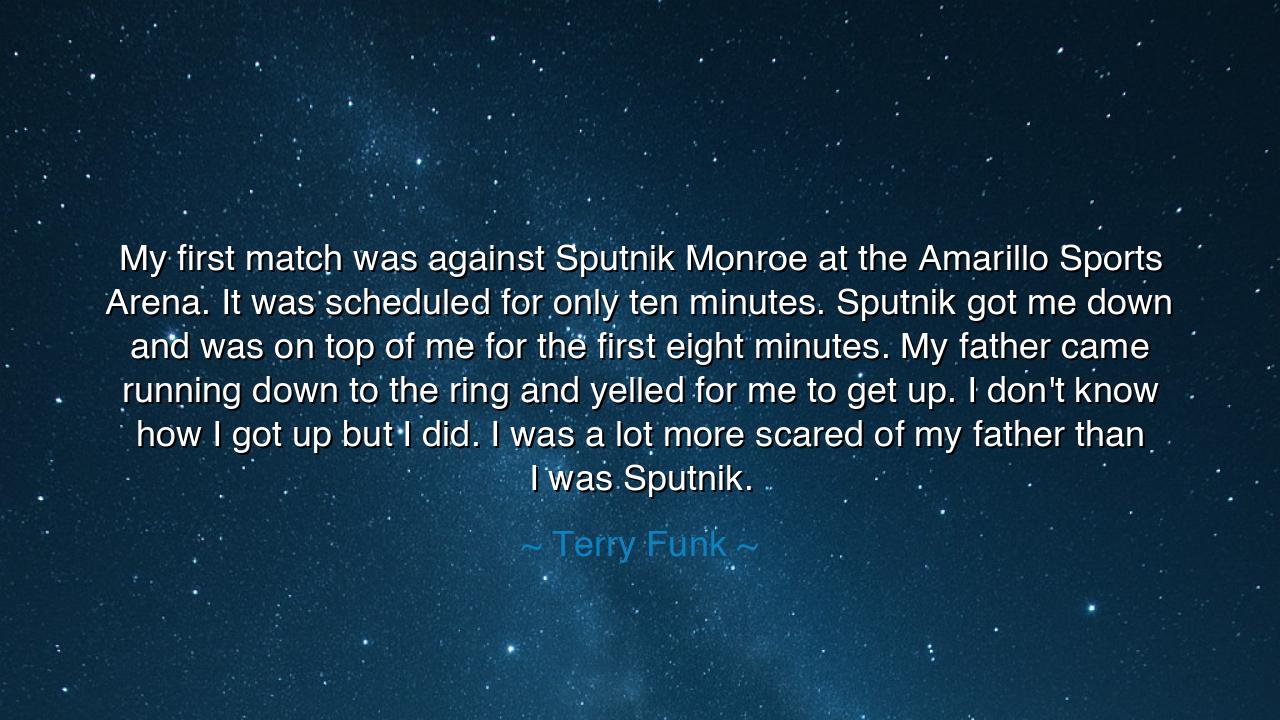
My first match was against Sputnik Monroe at the Amarillo Sports
My first match was against Sputnik Monroe at the Amarillo Sports Arena. It was scheduled for only ten minutes. Sputnik got me down and was on top of me for the first eight minutes. My father came running down to the ring and yelled for me to get up. I don't know how I got up but I did. I was a lot more scared of my father than I was Sputnik.






Terry Funk, a warrior of the wrestling ring, once recalled: “My first match was against Sputnik Monroe at the Amarillo Sports Arena. It was scheduled for only ten minutes. Sputnik got me down and was on top of me for the first eight minutes. My father came running down to the ring and yelled for me to get up. I don’t know how I got up but I did. I was a lot more scared of my father than I was Sputnik.” These words, though told as memory, resound with the thunder of timeless lessons. They speak not only of wrestling, but of fear, discipline, and the deep fire that rises when the voice of one’s father, mentor, or conscience commands you to rise.
In Funk’s recollection, the battle was not merely against Sputnik Monroe, a seasoned fighter and symbol of challenge, but against himself—his weakness, his exhaustion, his fear. For eight long minutes, he was pressed down, dominated, nearly broken. Yet in that darkest moment, another figure appeared: his father, whose voice pierced the despair. In truth, this was no ordinary voice—it was the voice of heritage, of expectation, of pride, of a man demanding that his son rise not only for victory, but for honor.
The ancients knew well that the presence of a father or teacher could awaken strength where none seemed left. Alexander the Great, weary on campaign, was said to find renewed energy when reminded of his father Philip’s conquests, for he would not allow himself to be less. In Japanese lore, samurai were taught that the voice of the master should live within them, louder than the cries of the enemy. Terry Funk, in that arena, found himself stirred not by his own courage alone, but by the fear of disappointing the man who shaped him.
It is telling that Funk admits: “I was a lot more scared of my father than I was Sputnik.” To modern ears, this may sound harsh, yet in truth it reveals the powerful bond between generations. His father was not merely a parent, but a living standard, a reminder of the strength that must be upheld. Sometimes, fear of failing those we love drives us further than the fear of any enemy. It is a sacred kind of fear, born not of terror, but of reverence—the fear of letting down the one who has entrusted you with a legacy.
History offers many examples of this force. Consider Hannibal of Carthage, who swore before his father Hamilcar, at the age of nine, never to be a friend to Rome. That vow, driven by the weight of his father’s words, carried him across the Alps and into the annals of legend. Or think of young Theodore Roosevelt, frail and sickly, who confessed that his greatest dread was not illness but failing the standards of his father, who had urged him to build strength through effort. Like Funk, they were shaped less by the blows of their enemies than by the voices of their fathers.
The emotional weight of Funk’s memory lies not in the match itself, but in the transformation within. The crowd saw a beaten young man suddenly rise. But he himself knew the truth: that his father’s voice had awakened something within him. The lesson here is universal: often, when life presses us down and the world seems heavier than we can bear, it is the presence or memory of someone we respect that gives us the will to rise. It may be a father, a mother, a mentor, or even the voice of our own higher self.
For the seeker of wisdom, the teaching is clear: do not underestimate the power of those who believe in you—or demand more of you. When they call you to rise, answer. And when you are weary, call to mind their voices, for they will often give you the courage your own heart cannot muster. Fear of failure can destroy—but fear of failing those we love can transform into a higher kind of strength, a reason to endure when the body cries to surrender.
What then must we do? Honor those whose voices call us to rise. Seek mentors and guides who demand our best. And when life places us in the role of elder or parent, let our voices be the ones that inspire courage, not despair. For Terry Funk’s memory reminds us that the greatest victories are not won with muscle alone, but with the fire ignited by love, respect, and the weight of legacy. And in this, every battle—whether in the ring, the field, or the struggles of daily life—becomes not just survival, but the proving ground of the soul.






AAdministratorAdministrator
Welcome, honored guests. Please leave a comment, we will respond soon